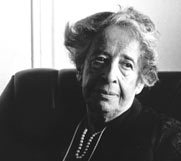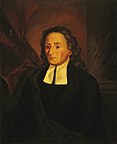
Hannah Arendt,1975

Giambattista Vico
Hannah Arendt, in her essay, ‘The Concept of History’[1], speaking about Giambattista Vico as “one of the fathers of modern historical consciousness”, stated:
In the modern age history emerged as something it never had been before. It was no longer composed of the deeds and sufferings of men, and it no longer told the story of events affecting the lives of men; it became a man-made process, the only all-comprehending process which owed its existence exclusively to the human race. Today this quality which distinguished history from nature is also a thing of the past. We know today that though we cannot “make” nature in the sense of creation, we are quite capable of starting new natural processes, and that in a sense therefore we “make nature,” to the extent, that is, that we “make history.” It is true we have reached this stage only with the nuclear discoveries, where natural forces are let loose, unchained, so to speak, and where the natural processes which take place would never have existed without direct interference of human action. This stage goes far beyond not only the premodern age, when wind and water were used to substitute for and multiply human forces, but also the industrial age, with its steam engine and internal-combustion motor, where natural forces were imitated and utilized as man-made means of production.
The contemporary decline of interest in the humanities, and especially in the study of history, which seems inevitable in all completely modernized countries, is quite in accord with the first impulses that led to modern historical science. What is definitely out of place today is the resignation which led Vico into the study of history. We can do in the natural-physical realm what he thought we could do only in the realm of history. We have begun to act into nature as we used to act into history. If it is merely a question of processes, it has turned out that man is as capable of starting natural processes which would not have come about without human interference as he is of starting something new in the field of human affairs.[2]
Arendt argued that that Vico had started the passage in modern historical consciousness because he believed it was impossible to ‘make nature’ (Arendt’s reference to ‘resignation’). Hence, for the ‘Enlightenment’-period-Vico, history would become the new science. We would only have knowledge of what we could make (constructionism). In the passage of time both natural and historical sciences were shaped by the shift of the question of why to how, from an interest in things to an interest in processes.[3] History was no longer a series of markers in events and persons, but themes which was connecting events and persons, so as to be able to explain how we got from the past to the present.
As Arendt points out, the great success of the sciences to ‘make nature’ has proven to be its unravelling. The technological agenda, “adequate to Vico’s ideal of knowledge”, has left us without any grounding for learning, a kind of Wittgenstein’s Ladder. As Arendt explains, “Vico, who is regarded by many as the father of modern history, would hardly have turned to history under modern conditions”. We have been so successful in the construction of the modern historical consciousness, being focused on processes and Techne, our sense of meaning is diminished and we have lost the strength of the humanities. What then must be done is to recover and re-translate that ‘history meaning’ for our times.
[1] Published in Hannah Arendt, Between Past and Future, Eight Exercises in Political Thought, Penguin Books, 1968.
[2] Ibid p. 58.
[3] Ibid. p. 57.
Neville Buch
Latest posts by Neville Buch (see all)
- J. D. Vance’s Insult to America is to Propagandize American Modernism - July 26, 2024
- Why both the two majority Australian political parties get it wrong, and why Australia is following the United States into ‘Higher Education’ idiocy - July 23, 2024
- Populist Nationalism Will Not Deliver; We have been Here Before, many times… - July 20, 2024
